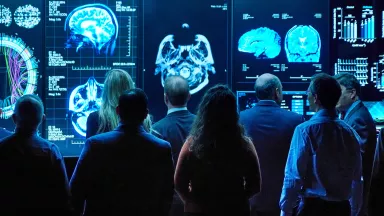What Is Encephalopathy?
Encephalopathy is a term for any disease of the brain that alters brain function or structure. As a result of these changes, altered mental states or behavior may be observed. If left untreated, encephalopathy may result in permanent brain damage, including progressive loss of memory and cognitive ability.
Types of Encephalopathy
Encephalopathy can be chronic or acute, and there are two types of encephalopathy: irreversible and reversible.
Reversible types of encephalopathy:
- Nonconvulsive status epilepticus—multiple seizures in the brain
- Brain tumors
- Long-term exposure to toxins including some metals, radiation, drugs, industrial chemicals, paints and solvents
- Brain infections like meningitis or encephalitis, as well as urinary tract and other infections in the body. Some of these infections can lead to extreme physical responses, like sepsis.
- Hashimoto’s encephalopathy, which is linked to a condition in the thyroid called Hashimoto’s disease. This autoimmune disorder attacks the brain, changing its function.
- Hepatic encephalopathy is when the liver cannot remove toxins from your blood, allowing them to build up in your body. This condition is common in people with cirrhosis of the liver, or after an overdose of medications like acetaminophen.
- Metabolic encephalopathy is a result of diabetes, liver diseases, heart failure or kidney failure that make it difficult for the brain to function.
Irreversible types of encephalopathy:
- Hypoxic-ischemic encephalopathy results from brain damage following a lack of oxygen to the brain. This is common following a near-drowning, carbon monoxide poisoning and cardiac arrest.
- Chronic traumatic encephalopathy is a result of frequent head injuries. This is common among boxers and high-impact sports like football.
Causes of Encephalopathy
This group of diseases has a range of causes, including:
- Infection
- Metabolic or mitochondrial dysfunction
- A brain tumor, or increased pressure in the skull
- Prolonged exposure to toxic elements (including solvents, drugs, radiation, paints, industrial chemicals and certain metals)
- Chronic and progressive trauma
- Poor nutrition
- A lack of oxygen or blood flow to the brain
Risk Factors for Encephalopathy
Avoiding high-risk factors and contributors can reduce risk of encephalopathy. Avoiding exposure to toxic elements, being cautious and careful to avoid head and neck trauma, and maintaining a healthy lifestyle are all ways to prevent contracting encephalopathy, except in cases of accidents and congenital prognosis.
Screening for & Preventing Encephalopathy
There is no standard method to test for encephalopathy, but blood tests can reveal any present infections. To test cognitive decline, the psychometric hepatic encephalopathy score (PHES) test is considered the gold standard in the diagnosis of encephalopathy. It consists of five paper-and-pencil test sheets: number connection test A and B, serial dotting test (SDT), digit symbol test (DST) and line tracing test (LTT). These tests are designed to assess concentration, attention, memory, speed, and motor and visual accuracy.
Signs & Symptoms of Encephalopathy
The hallmark of encephalopathy is an altered mental state. Common neurological symptoms are:
- Progressive loss of memory and cognitive ability
- Subtle personality changes
- Inability to concentrate
- Lethargy
- Progressive loss of consciousness
Other neurological symptoms may include:
- Myoclonus (involuntary twitching of a muscle or group of muscles)
- Nystagmus (rapid, involuntary eye movement)
- Tremor
- Muscle atrophy and weakness
- Dementia
- Seizures
- Loss of ability to swallow or speak
Diagnosing Encephalopathy
Diagnostic tests such as blood tests, spinal fluid examination, imaging studies, electroencephalograms and similar studies may be used to differentiate the various causes of encephalopathy.
Treating Encephalopathy
Treatment for encephalopathy is symptomatic and varies, according to the type and severity of the diagnosis. Your physician can provide specific instructions for proper care and treatment. Anticonvulsants may be prescribed to reduce or stop any seizures. Changes to diet and nutritional supplements may help some people with the disease. In severe cases, dialysis or organ replacement surgery may be needed.
Treating the underlying cause of the disorder may improve symptoms. However, encephalopathy may cause permanent structural changes and irreversible damage to the brain. Some encephalopathies can be fatal.
Living with Encephalopathy
Encephalopathy is often reversible with treatment. However, people with underlying chronic disorders such as liver disease are more likely to have repeated episodes of encephalopathy and need ongoing treatment.
To further your understanding of your diagnosis and to contribute to cutting-edge research, consider participating in a clinical trial so clinicians and scientists can learn more about causes, symptoms, treatment and prevention. Clinical research uses human volunteers to help researchers learn more about a disorder and perhaps find better ways to safely detect, treat or prevent disease.
All types of volunteers are needed—those who are healthy or may have an illness or disease—of all different ages, sexes, races and ethnicities to ensure that study results apply to as many people as possible, and that treatments will be safe and effective for everyone who will use them.
For information about participating in clinical research, visit NIH Clinical Research Trials and You. Learn about clinical trials currently looking for participants at Clinicaltrials.gov.




